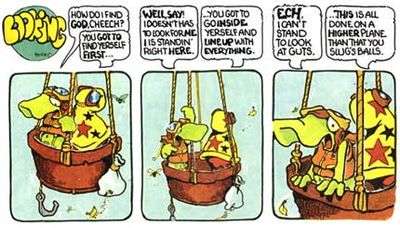Cheech Wizard
| Cheech Wizard | |
|---|---|
|
Cheech Wizard, in a characteristic discussion of the search for God. Art by Vaughn Bodé. | |
| Publication information | |
| Publisher | National Lampoon, Last Gasp, Fantagraphics |
| First appearance | 1967 |
| Created by | Vaughn Bodé |
| In-story information | |
| Alter ego | unknown |
| Partnerships | Razzberry |
Cheech Wizard is an American underground comics character created by artist Vaughn Bodé and appearing in various works, including the National Lampoon, from 1967 until Bodé's death in 1975. A mysterious character of unknown origins, The Wizard is constantly in search of a good party, cold beer, and attractive women. The Cheech Wizard is often drawn in graffiti murals and street art,[1] and has been repeatedly referenced in pop music.
Publication history
Though the character was, according to Bodé, created in 1957, Cheech didn't see print until 1967, when he appeared in various publications being produced by the counterculture developing around the Syracuse University campus (where Bodé was attending school).
Cheech Wizard stories ran in the "Funny Pages" of National Lampoon magazine in almost every issue from 1971 to 1975.
The first Cheech Wizard collection was published in 1972 by Last Gasp. All the Cheech Wizard stories were later collected and reprinted in two volumes by Fantagraphics Books.
Cheech Wizard was revived by Bodé's son Mark Bodé in The Lizard of Oz (Fantagraphics, 2004), a send-up of The Wizard of Oz based on an original concept by Vaughn Bodé.[1]
Character appearance and personality
The Wizard wears a very large yellow Phrygian cap decorated with wizard symbols instead of a wizard's pointed hat, with his legs, clad in what appear to be red tights, visible underneath. His appearance and species have never been revealed. In an early comic, Captured by Morton Frog (1967), Cheech takes off his hat for a police officer, a priest and a political leader. You can clearly see him holding his hat in his hands, away from the rest of his body. The face is hidden by the speech balloon, but you can see glimpses of hair on top. All three persons witnessing his face fall into cataleptic states forever. Cheech walks away from their fortress claiming that "Their primitive minds couldn't accept da truth". In a later comic, Who is C.W.? (1974), one of Cheech's lovers insists on seeing his true face. Cheech claims that she will die instantly, or go insane. After having her sign a waiver freeing him of legal responsibilities, he agrees to take off his hat. The comic ends abruptly at mid-page with Cheech saying "Okay! Here goes, but I bet you go blind!", followed by a blank (white-out) panel.
Cheech Wizard speaks in an ungrammatical sort of urban dialect. He was generally accompanied by his lizard apprentice, Razzberry (until that character was killed off). Cheech was depicted as foul-mouthed, often drunk or high on drugs, and constantly on the make. His attitude towards his fellow residents of the magic forest in which he lived (generally talking male animals and human females, the latter invariably under-dressed) was usually one of contempt. Curiously, he was referred to (often by himself) as the Cartoon Messiah, which suggested Bodé's long-standing interest in mysticism. But his general reaction to anyone who annoys him (and the list there is quite long) is to deliver a swift kick to the groin. Mark Bodé claims that the Cheech Wizard was his father's "alter-ego, . . . a bad-mouth hat with no respect for anyone, completely the opposite of Vaughn, who was charismatic but shy."[1]
In popular culture
- Kidrobot's first toy was a Cheech Wizard
- In 2007, Puma released a limited-edition shoe and matching hoodie inspired by Cheech Wizard (and designed by Mark Bodé).[2]
- The cable TV show Burn Notice had an 8-foot-tall (2.4 m) Cheech Wizard graffiti in the background of one scene.
- The logo of Lucky Spin Recordings is based on the drawings of Razzberry[3]
Music
- The Beastie Boys songs "The Sounds of Science", from their 1989 album Paul's Boutique; and "Sure Shot", from their 1994 album Ill Communication reference Cheech Wizard.
- Aesop Rock references Bode's Cheech Wizard in his song "Fast Cars" off of the album Fast Cars, Danger, Fire And Knives. He raps, "it's A-E-S-O-P-R-O-C-K, the peak twister. Defender of the son of Vaughn Bodé's Cheech Wizard."
- Bundy K. Brown references Cheech Wizard in his song "Attention Span Deficit Disorder Disruption," from the 1989 album Post-Global Music
- From 1990's till 2006 there was a progressive band called Cheech Wizard in the Netherlands. There are talks about a reunion in 2014.
- A remix of The Sea and Cake was done by Bundy K. Brown in 2008 and the title of the track is "Sporting Life The Cheech Wizard Meets Baby Ultraman In The Cool Blue Cave (Short stories about birds, trees, and the sports of life wherever you are)."
Bibliography
- The Collected Cheech Wizard (Print Mint, 1972) ASIN B0016GTI2I
- Cheech Wizard, Schizophrenia #1 — Suck My Turnip (Last Gasp, 1973) ASIN B006TODEAE
- Deadbone: the First Testament of Cheech Wizard, the Cartoon Messiah (Northern Comfort Communications, 1975) ISBN 0969050607
- Vaughn Bodé's Cheech Wizard (Northern Comfort Communications, 1976) ISBN 0969050623
- The Complete Cheech Wizard vols. 1-3 (Rip Off Press, 1986)
- Cheech Wizard vol. 1 (Fantagraphics, 1990) ISBN 1560970421
- Cheech Wizard vol. 2 (Fantagraphics, 1991) ASIN B009FQ4TGG
- The Lizard of Oz (Fantagraphics, 2004) ISBN 978-1560975953
References
- 1 2 3 Frucci, Angela (2004-05-31). "Following a Wiz to a Far-Out Oz; A Son Completes the Legacy Of an Underground Cartoonist". The New York Times. Retrieved 2008-04-22.
- ↑ Harmanci, Reyhan, "The Bay Citizen: In Finishing Comics, a Son Completes a Legacy," New York Times (July 1, 2010).
- ↑ Lucky Spin Recordings entry, MusicStack. Accessed May 12, 2014.
